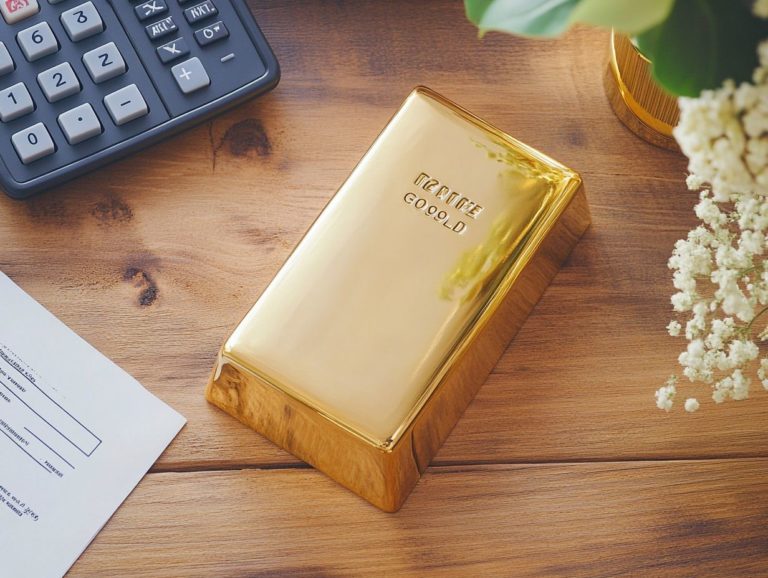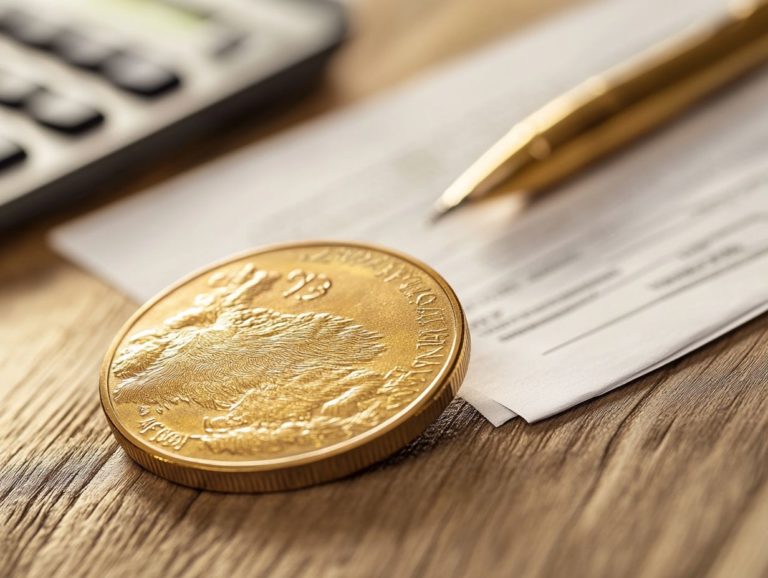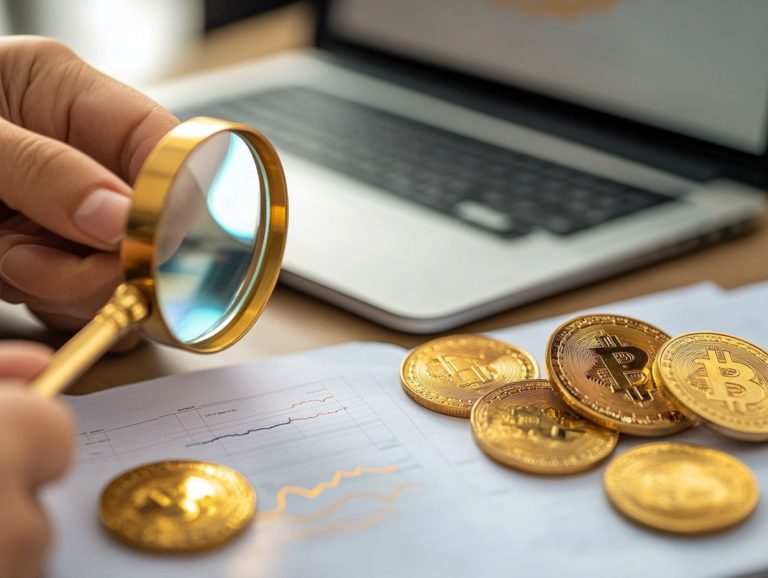How to Minimize Tax Liabilities on Precious Metals?
Investing in precious metals can be a savvy financial decision. However, you might find the tax implications quite daunting.
This guide outlines crucial strategies to help you minimize tax liabilities and optimize your investments. Uncover the advantages of tax-advantaged accounts designed specifically for precious metals. Grasp essential tips for effective tax reporting and record-keeping, while understanding how state-specific regulations could influence your holdings.
Arm yourself with the insights needed to enhance your returns while ensuring compliance.
Contents
- Key Takeaways:
- Minimizing Tax Liabilities
- Tax-Advantaged Accounts for Precious Metals
- Tax Reporting and Record-Keeping
- State-Specific Tax Considerations
- Common Questions About Precious Metals Taxes
- 1. How can I minimize tax liabilities on precious metals in the United States?
- 2. Are there specific rules for minimizing taxes on precious metals?
- 3. Can I use any type of precious metal to minimize tax liabilities?
- 4. Is there a limit on how much I can invest in precious metals to minimize taxes?
- 5. Are there tax benefits to holding physical precious metals?
- 6. What are the tax implications of buying and selling precious metals internationally?
Key Takeaways:
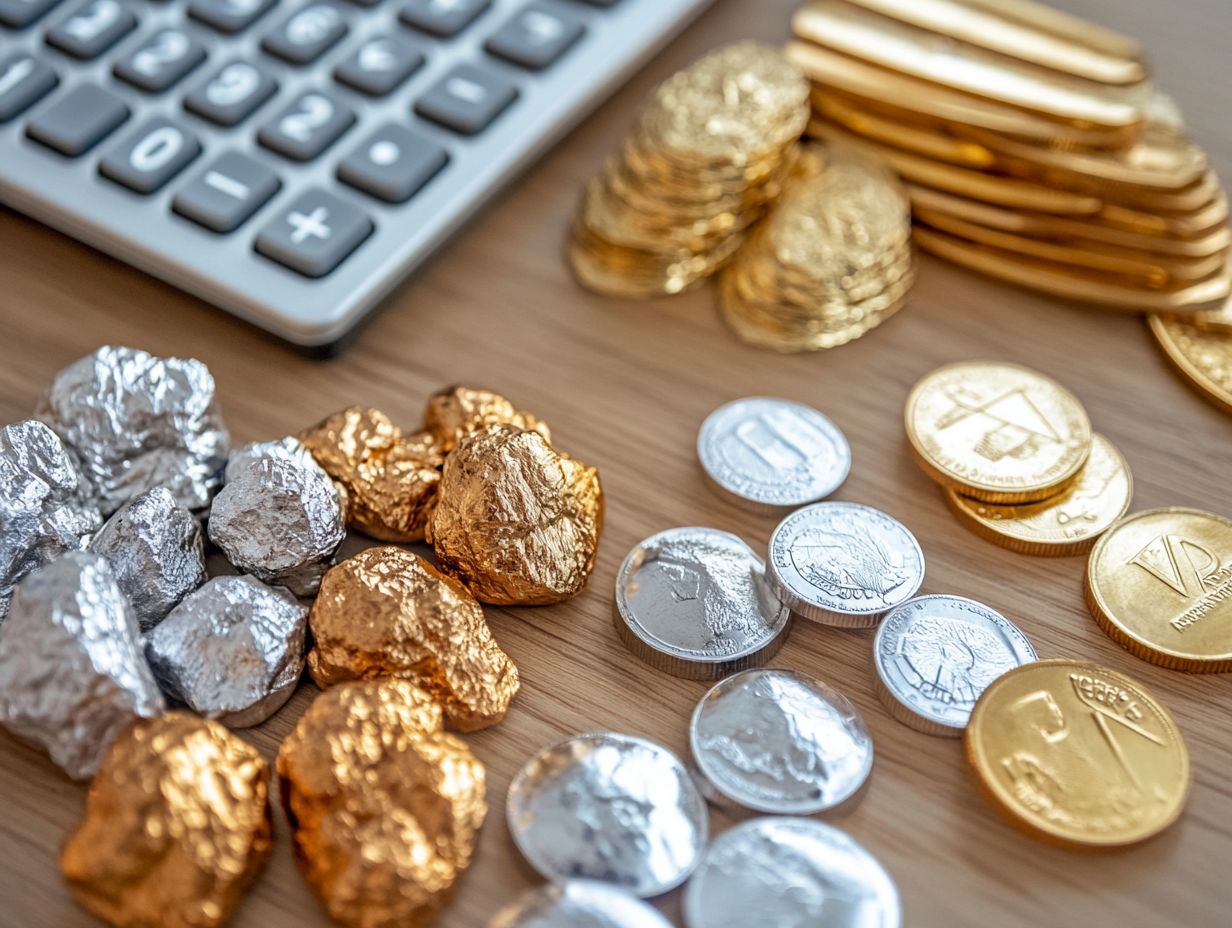
- Unlock tax savings by investing in tax-advantaged accounts, such as a self-directed IRA or a precious metals ETF, to minimize tax liabilities on precious metals.
- Keep accurate and detailed records of your precious metal investments to report them properly on your taxes and potentially reduce your tax burden.
- Be aware of state-specific tax considerations, as some states may impose lower or higher taxes on precious metals than others.
Understanding Taxation on Precious Metals
Understanding the taxation on precious metals, like gold, silver, and platinum, is essential for you as an investor. This knowledge is particularly important when navigating the details of capital gains tax imposed by the IRS.
You need to grasp how these physical assets are valued, along with the tax implications that come with investing in these commodities.
Whether you’re considering diversifying your portfolio with precious metals or using them as a hedge against inflation, being well-informed about taxation is crucial for making strategic investment decisions.
It’s essential to know that the IRS classifies precious metals as collectibles. This means any long-term gains, those held for over a year, are taxed at a rate of 28%. For detailed information on this topic, refer to the tax implications of selling your precious metals collection. That’s significantly higher than the more favorable rates applied to other capital assets.
On the flip side, short-term gains from holdings of a year or less are taxed at ordinary income rates. Keeping precise records of market values and transactions is vital for ensuring compliance and smooth reporting.
Investment companies often help clients document these details while recommending strategies like tax-loss harvesting. Tax-loss harvesting involves selling a losing investment to offset gains and reduce tax liability. By staying educated on relevant IRS regulations and employing effective tax strategies, such as how to manage capital gains from precious metals sales, you can enhance your returns while adeptly navigating the complexities of precious metal taxation.
Minimizing Tax Liabilities
Minimizing tax liabilities when investing in precious metals demands your keen insight into various investment strategies and the potential deductions they may provide.
By exploring options like ETFs and mutual funds dedicated to gold, silver, and platinum, you can adeptly navigate capital gains tax.
This approach not only helps to safeguard your overall portfolio’s diversification but also maximizes your potential returns.
Strategies and Tips for Reducing Taxes
Implementing effective strategies and tips for reducing taxes on precious metals can significantly boost your investment returns while minimizing the impact of capital gains tax. One smart tactic to consider is utilizing tax-deferred accounts like Roth IRAs, which offer specific tax advantages that can enhance your overall strategy.
You should understand the implications of capital gains tax, as it can vary based on how long you hold your assets. For instance, long-term capital gains usually benefit from lower tax rates compared to short-term gains.
Staying informed about IRS regulations is crucial, as any new laws or changes can directly impact your taxation on precious metals. Regularly reviewing your portfolio transactions and considering tax-loss harvesting can further improve your tax efficiency.
By contributing to tax-efficient funds, you can grow your wealth while keeping taxes in check. Strategic planning is essential to maximize your returns and make the most of your investments.
Tax-Advantaged Accounts for Precious Metals
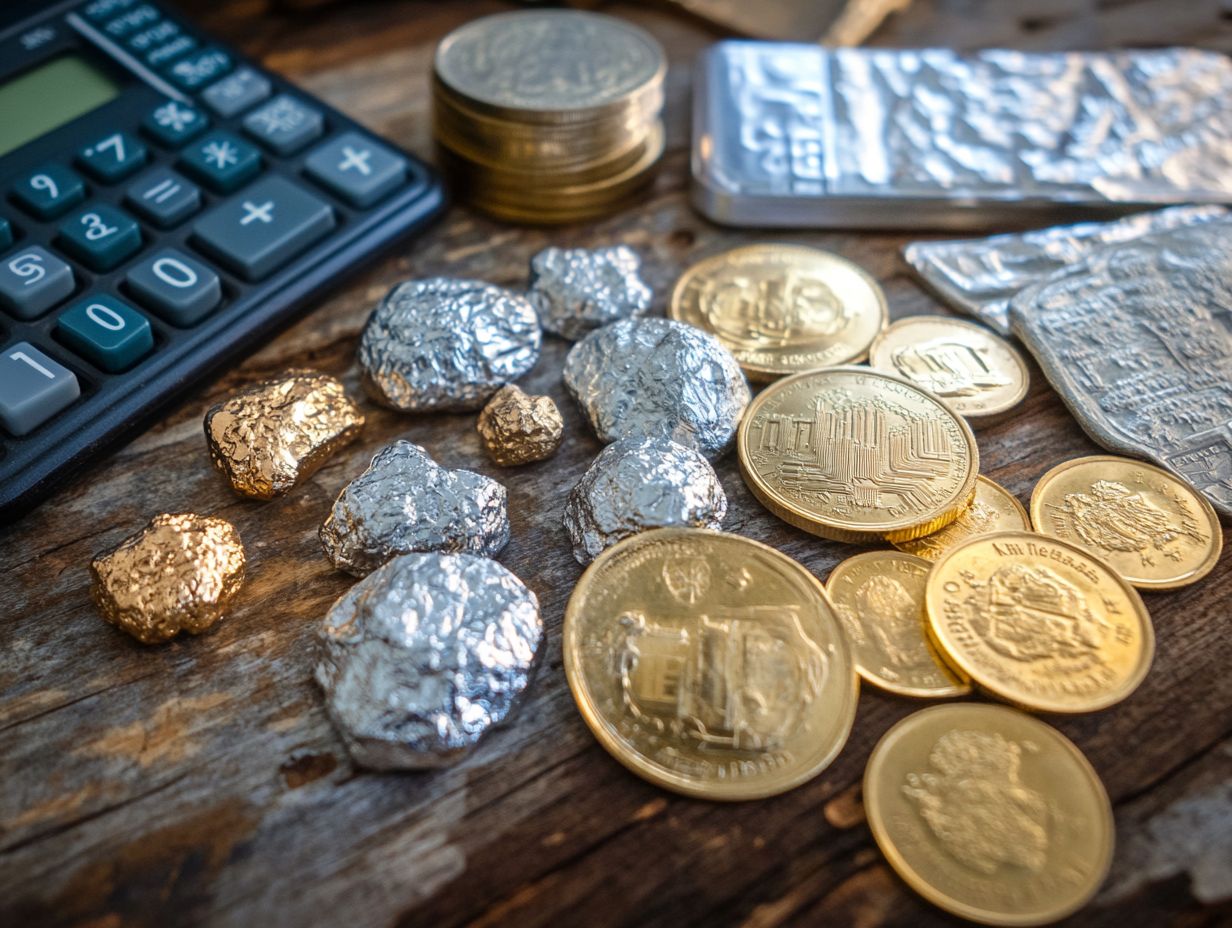
Tax-advantaged accounts, like Roth IRAs and specialized gold IRAs, present a savvy opportunity for you to hold precious metals while enjoying favorable tax benefits. By leveraging these investment vehicles, you can shield your portfolio from economic uncertainties, effectively hedge against inflation, and optimize your long-term financial objectives.
Types of Accounts and Benefits
You have several options when it comes to tax-advantaged accounts for investing in precious metals, with gold IRAs and Roth IRAs standing out for their unique tax benefits. Each of these accounts offers distinct advantages. They are tailored to different investment strategies, giving you the power to make informed decisions about your portfolio.
For example, a traditional gold IRA allows your contributions to grow tax-deferred until retirement, which is ideal if you plan to hold your investments long-term. On the other hand, a Roth IRA provides the perk of tax-free withdrawals in retirement, making it particularly appealing if you anticipate being in a higher tax bracket down the line. It’s also important to consider the tax consequences of trading precious metals when making your investment decisions.
You can also use options like Health Savings Accounts (HSAs) for precious metals investments, enabling you to diversify not just your retirement portfolio but your overall asset base.
Understanding these details can significantly elevate your investment strategy in precious metals.
Tax Reporting and Record-Keeping
Accurate tax reporting and careful record-keeping are essential for every precious metals investor, especially given the complexities of capital gains tax and IRS regulations.
By maintaining proper documentation, you not only ensure compliance but also position yourself to take full advantage of the tax benefits and deductions available for your investments in gold, silver, and platinum.
What You Need to Know
You should understand the key aspects of tax reporting for precious metals, particularly capital gains tax and the IRS requirements you must adhere to. Understanding these regulations is crucial for ensuring compliance and maximizing the benefits from investment companies that can provide valuable resources and guidance.
You should know how to accurately report capital gains and losses, as these fluctuations directly influence your overall tax liability. Since the IRS classifies precious metals as collectibles, they are typically subject to higher tax rates compared to other investment assets. To navigate this, it’s crucial to understand how to handle tax liabilities on precious metals sales. This unique categorization adds another layer of complexity to your tax reporting.
Investment companies can be invaluable allies in navigating these intricate requirements. They help you compile the necessary documentation and ensure that all transactions are properly recorded. Additionally, they can offer insights into how to navigate tax implications of precious metals that may help minimize the liabilities associated with your investments.
State-Specific Tax Considerations
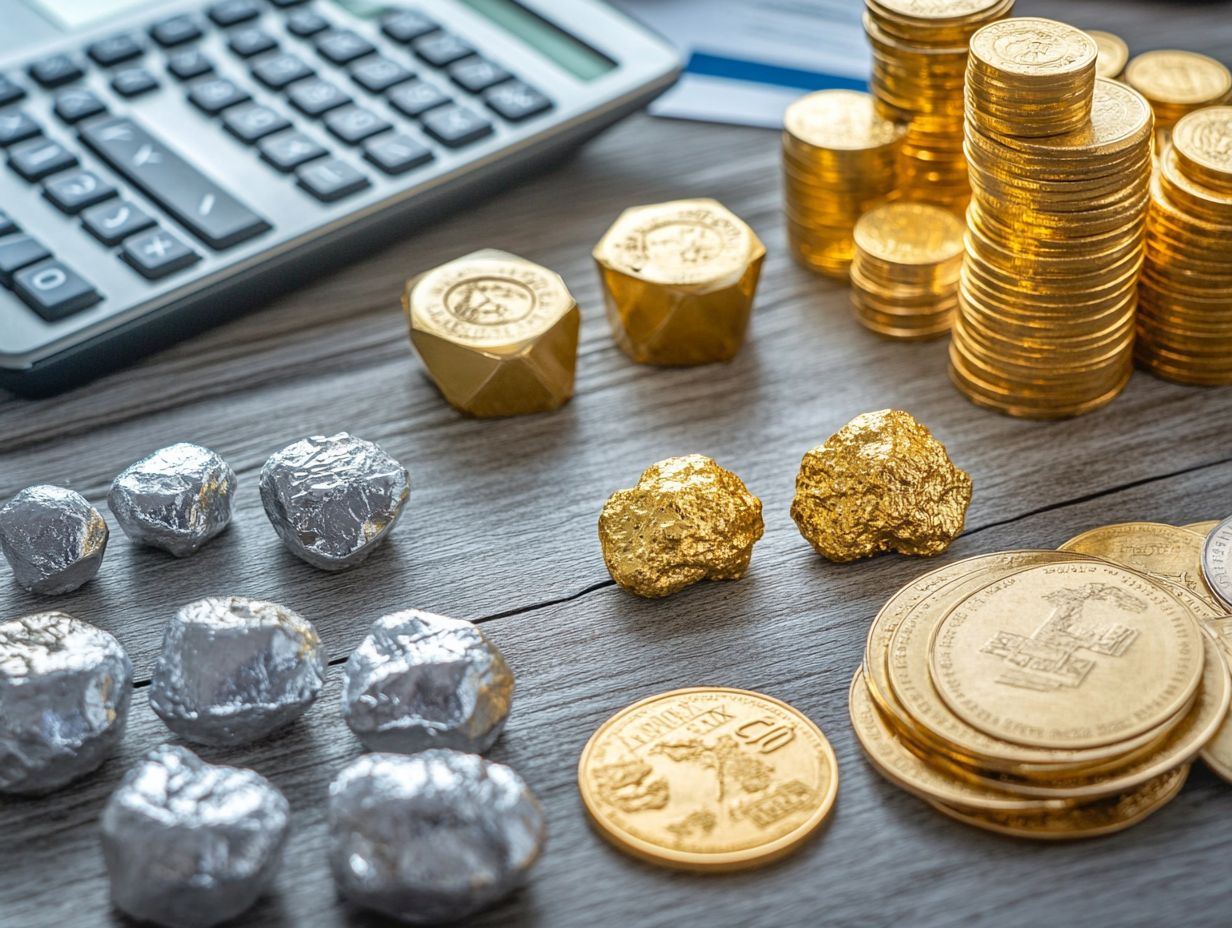
Understanding state-specific tax regulations is critical. Your investment’s success may depend on this knowledge. Since different states have their own regulations regarding capital gains tax and related fees, grasping these details becomes essential for you.
This understanding not only ensures compliance but also allows you to optimize your investment strategies effectively.
State Taxes on Precious Metals
State taxes on precious metals differ significantly. This affects how profit tax applies to your investments and can shape your investment choices.
For instance, Texas and Florida have no state income tax. This is advantageous for investors in gold and silver, as it lowers the overall tax burden.
Conversely, states like New York impose a profit tax. It’s essential to understand how these taxes will impact your returns.
These tax regulations influence both the costs of acquiring precious metals and your long-term profitability when selling them. Careful consideration of these factors can shape your investment strategies and affect your financial outcomes.
Common Questions About Precious Metals Taxes
1. How can I minimize tax liabilities on precious metals in the United States?
One way to minimize taxes is by using a self-directed IRA. This allows you to defer taxes on gains until you withdraw funds.
2. Are there specific rules for minimizing taxes on precious metals?
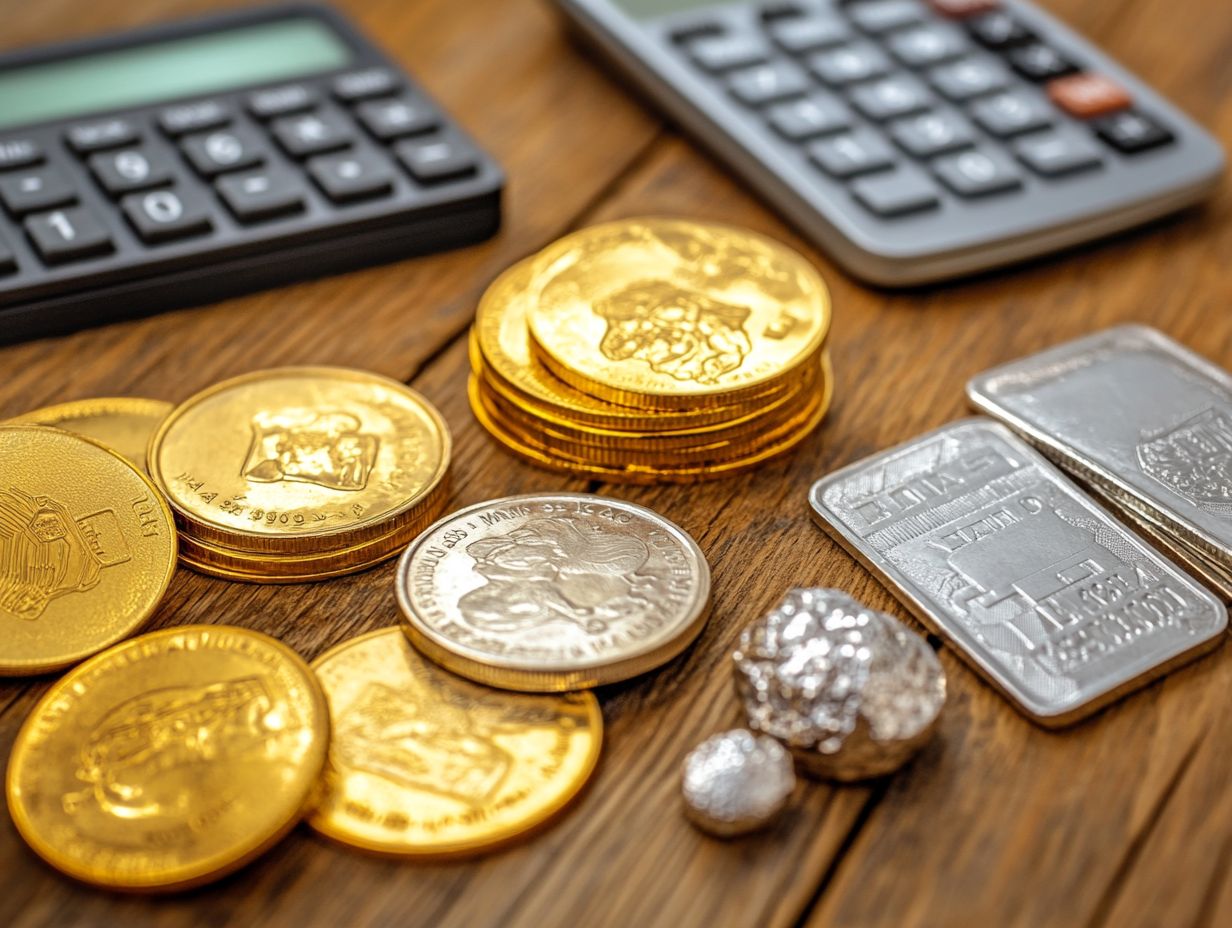
Yes, there are rules regarding gains from the sale of precious metals. These gains are generally subject to profit tax.
3. Can I use any type of precious metal to minimize tax liabilities?
You can use various precious metals like gold, silver, and platinum. Each one has different tax implications, so consult a tax advisor first.
4. Is there a limit on how much I can invest in precious metals to minimize taxes?
No, there s no investment limit for tax minimization. However, consider your overall portfolio and seek advice for a balanced, tax-efficient strategy.
5. Are there tax benefits to holding physical precious metals?
Yes, holding physical metals can offer tax benefits, such as deductions for storage fees. It also protects you against inflation.
6. What are the tax implications of buying and selling precious metals internationally?
International transactions can lead to complex tax issues due to different jurisdictions. Consult a tax advisor to navigate potential liabilities effectively.










